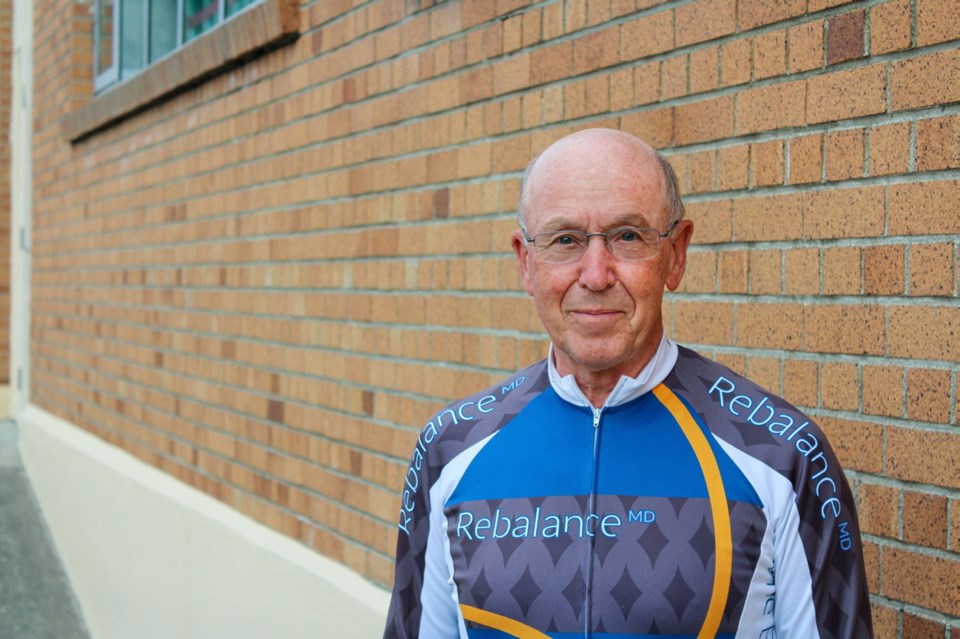Everything turned out fine when the doctor became the patient, thanks to some fine work by his peers and a boost from technology.
Dr. Ralph Lapp, who describes himself as “an orthopedic surgeon by trade,” is eight years into retirement but still scrubs up to assist with the occasional procedure at local hospitals.
He said he loves making people better. “But a year ago, the tables turned, and I, for once, was the one in need of crucial, advanced care at Royal Jubilee Hospital.”
Lapp was diagnosed with prostate cancer in 2019 at age 71. It was the same disease that took the life of a close friend.
“It could have been me,” he said.
Lapp’s diagnosis came despite the fact he lacked such symptoms as urinary-tract issues or an enlarged prostate. “I had no symptoms and I had no physical signs.”
But his “astute” general practitioner noted he hadn’t had a prostate-specific antigen blood test for many years, and one was ordered. It led to the calculation of a PSA ratio that indicated Lapp’s odds of having prostate cancer were two out of three.
A subsequent biopsy of the prostate by urologist Dr. Iain McAuley showed evidence of cancer in one of 12 random tissue samples taken.
That was followed by McAuley sending him for an MRI scan that revealed the cancer was eroding the capsule around the prostate.
The next step for Lapp was a radical prostatectomy that saw his prostate gland and its surrounding tissues removed. Lapp said that having the surgery was the second-best decision he made in concert with his doctors — the first was getting the MRI.
He said the MRI is what “tipped the balance” in his journey of care.
“Without it, we would have monitored the condition, sure, but who knows if we would have caught the spreading of the cancerous tumour,” Lapp said. “Over time, who knows where and how aggressively the tumour would have spread.
“To this day, I believe the MRI findings helped lead the care that saved my life.”
Things couldn’t have gone better, he said.
“I was in the right place having the right people ordering the right tests.”
Lapp said MRI technology has transformed the medical field. It was first used in the 1970s.
He said that when he was a young man in medical school, the lack of such technology meant the prognosis for a case such as his would not have been good.
“The new MRI technology and minimally invasive laparoscopic surgeries have made an incredible difference and luckily, with early detection, surviving prostate cancer is the norm,” Lapp said.
He said he is a big supporter of the Victoria Hospitals Foundation’s ongoing Big Picture Campaign, which is raising $4 million to ensure that the region has the latest in imaging technology, including MRIs.
The campaign has already been able to secure a new 3T MRI — a first for Island Health — thanks in large part to a $600,000 donation by real-estate developer Townline. It wasn’t in place during Lapp’s treatment but is serving patients now.
Dr. Shane Greek, Island Health’s section head for MRIs, said the 3T MRI has twice the imaging power of older models and is also quieter and more comfortable for patients. He said it can produce three-dimensional “diagnostic movies” of blood flow in the heart “without so much as a pin prick.”
Greek said the speed at which the 3T MRI works will effectively reduce wait times, and since it is more open than previous models, it will be easier on claustrophobic patients.
He applauded the Big Picture Campaign.
“The Big Picture is a true testament to the work done every day in medical imaging,” Greek said. “It honours the idea that more than half of all health-care encounters require medical imaging, and the important notion that while imaging is equipment-intensive, it is patient-centred and ultimately impacts all of us.
“We in the department of medical imaging are deeply grateful to you, the generous donors to the Victoria Hospitals Foundation, for supporting our local hospitals.”
Lapp said donors to the foundation make a difference in people’s lives.
“Thank you for your generosity and thank you for your confidence in our work. It matters.”
HOW TO DONATE
Donations to the Big Picture Campaign can be made by:
- Going to victoriahf.ca/bigpicture
- Calling 250-519-1750
- Mailing a cheque to Wilson Block, 1952 Bay St., Victoria, B.C., V8R 1J8



